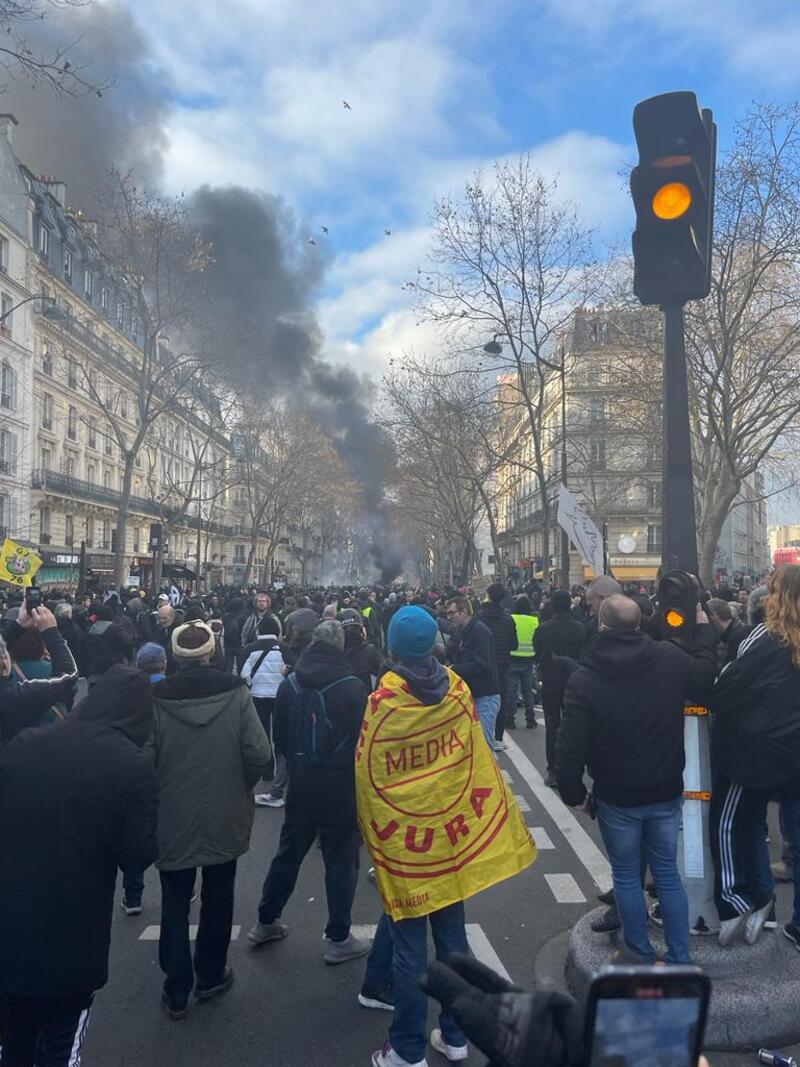What Do the French Pension Strikes Really Mean?

France is no stranger to strikes and demonstrations, so much so that it has become a defining stereotype of the country. So are the recent pension strikes happening in Paris and across France just another example of the French passion to protest? Or are they indicators of a larger systemic change on the horizon in European politics?
The current series of strikes began on January 19, with an impressive 1.1 million taking to the streets to protest across France. Additionally, Paris saw many delays to public transit as transport labor unions protested.
The strikes and protests are a direct response to President Macron’s plan to raise the retirement age from 62 to 64. Macron believes this increase in standard retirement age is necessary to prevent the collapse of the shaky pension system. However, left-wing parties in opposition of this reform—like La France Insoumise, the Socialist Party and the French Communist Party—say that the prevention should come from increased taxation of wealthy individuals and corporations.
Following the January 19 strike, unions organized similar strikes and demonstrations on multiple other dates in January, February and March.
AUP students, Grayson Denton and Matteo Perardi, attended a pension reform demonstration on February 11 at Place de la Nation in the 11th and 12th arrondissements of Paris. According to Denton and Perardi, the demonstration was, “like a parade,” with a wide variety of age groups in attendance. This observation came in stark contrast to other protests they had attended in the US, in which violence and aggression were defining characteristics. At Nation, onlookers sipped espresso at cafes and locals continued with their Saturday errands at shops that remained open.
However, the demonstration was not without moments of intensity. There were several instances of police-led charges into the crowd, and, in response, protestors threw pebbles and glass bottles.
Protests are ingrained in French culture and the ability to express discontent with the actions of the government holds great importance for France.
In #Paris, the protests have turned into riots: cars are on fire, police use tear gas and water cannons.
The protests began because of the increase in the retirement age (from 62 to 64 years). The bill was passed by the government and ignored the parliamentary vote.
Protesters… https://t.co/DouNNc3Kk5 pic.twitter.com/UgqyUl6R6D— NEXTA (@nexta_tv) March 16, 2023
AUP professor of History and International Relations, Philip Golub, gave his perspective on the significance of the recent strikes in a broader global political context.
According to Golub, retirement is just the surface of these strikes.
“There is a lot of dissatisfaction over the law itself and the lack of consternation over the law, but there are also all kinds of other dissatisfactions expressed in this,” Golub said.
Golub attributes the French situation to a significant pattern in global politics, commenting, “The buildup over longer periods of time of dissatisfactions about wage conditions, about working conditions, about workplace relations and things of this type in the face of governments that, for the most part, have been quite deaf to the demands of the unions and deaf to the demands of the more progressive parties.”
As unions are continuously weakened by national governments, the response generated becomes more severe.
Golub draws a connection between the French protests and the similar unrest from unions in both the U.S. and the U.K. Appearing to be a trend, it calls forth a reconsideration of the policies on labor conditions that have been implemented, specifically in the last twenty years.
“Over the past twenty, twenty-five years, governments have been withdrawing some of the protections of the welfare state and this creates alienation, fear, a sense among many of social down-classing, and a sense of loss of protection," Golub said. These are feelings that would warrant a strong desire for protest.
According to polls, the majority of France is in opposition to the proposed reforms, and the turnouts for demonstrations further suggest that this is just the beginning of a greater push for the protection of workers' rights and labor unions.
Up next for unions in France is an organized mass shutdown on March 7 and the outcome is likely to be another indicator of the future potential of this trend.





